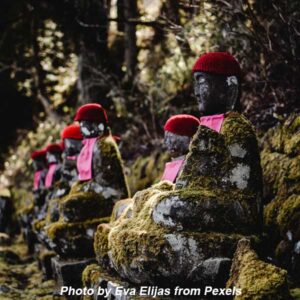His Holiness The 14th Dalai Lama (a.k.a. Gyalwa Rinpoche) serves as the highest spiritual leader of Tibet and a living Bodhisattva, or one on the path to Buddhahood (an awakened one). For those of us who are curious about this spiritual path, The Dalai Lama provides a roadmap in A Flash of Lightening in the Dark of Night: A Guide to the Bodhisattva’s Way of Life.
 He opens the book with a brief discussion of core Buddhist principles, including the Four Noble Truths (discussed in last week’s post). He also tells us that the Bodhisattva takes refuge in three elements: the exemplary life of the Buddha, the Buddha’s teaching (Dharma), and the community of followers (Sangha). They inform and model his or her thoughts and behaviors and provide encouragement on the path. Interestingly enough, the Dalai Lama cautions against taking the Buddha’s teachings at face value out of reverence. Rather, one should examine each precept thoroughly and respect them only when finding a reason to do so.
He opens the book with a brief discussion of core Buddhist principles, including the Four Noble Truths (discussed in last week’s post). He also tells us that the Bodhisattva takes refuge in three elements: the exemplary life of the Buddha, the Buddha’s teaching (Dharma), and the community of followers (Sangha). They inform and model his or her thoughts and behaviors and provide encouragement on the path. Interestingly enough, the Dalai Lama cautions against taking the Buddha’s teachings at face value out of reverence. Rather, one should examine each precept thoroughly and respect them only when finding a reason to do so.
As I read through the book, I made note of several elemental character traits that the Bodhisattva embodies (and that we would do well to emulate):
Carefulness: We must beware of the tendency toward self-centeredness. We are interdependent beings who coexist in a complex web of causes and effects. We act in the best interests of ourselves and others by helping all beings find happiness and avoid suffering.
Attentiveness: We must be alert to the allure of negative emotions; they take root in the mind, obfuscate truth, and do harm. Attentiveness is the watchdog that guards against negativity in thoughts, words, and deeds, and directs the heart and mind toward all that is positive for ourselves and others. We must avoid even the smallest negative action; we should do even the smallest good.
Patience: Given pervasive suffering and our propensity to react adversely toward it, we must put forth the effort to cultivate a peaceful state of mind that wards off anger and upset. When we develop the capacity for forbearance, we grow in tolerance and remain undisturbed. When people behave unkindly toward us or others, we do not react in anger or retaliate. We consider them “teachers” with whom we practice patience; we offer them compassion. Likewise, when others are prone to lavish praise upon us, we must not become attached to it. Even if well-intentioned, praise is a distraction.
Endeavor: The enlightened being makes purposeful use of one’s short time on earth by doing what is good. We realize our potential by leveraging four supports: noble aspiration, firmness (i.e., confidence in our capacity to do the task at hand properly), a joyful countenance with regard to our work, and moderation (so we don’t overdo it and burn ourselves out!)
Meditative Concentration: Meditation trains and transforms the mind toward a focus on kindness, love, compassion, and non-harm toward others. It tamps down the distraction of random thoughts that may go negative or form needless attachment. This practice proves essential for clear insight. It cultivates a good heart, the source of all happiness and joy.
Wisdom: The wise person acknowledges that everything we experience in life – including our own sense of self – reflects our perceptions, not reality. Because ours is a relative truth, we must not cling to it and close our minds to new insights. Rather, we glimpse at the absolute nature of things by listening, reflecting, and meditating on our experience.
Finally, The Dalai Lama reminds us that we are but tourists on this planet for a short visit. Let us all resolve to receive this endowment with a good heart and a deep intention to take positive actions with compassion and make something useful of our time here.